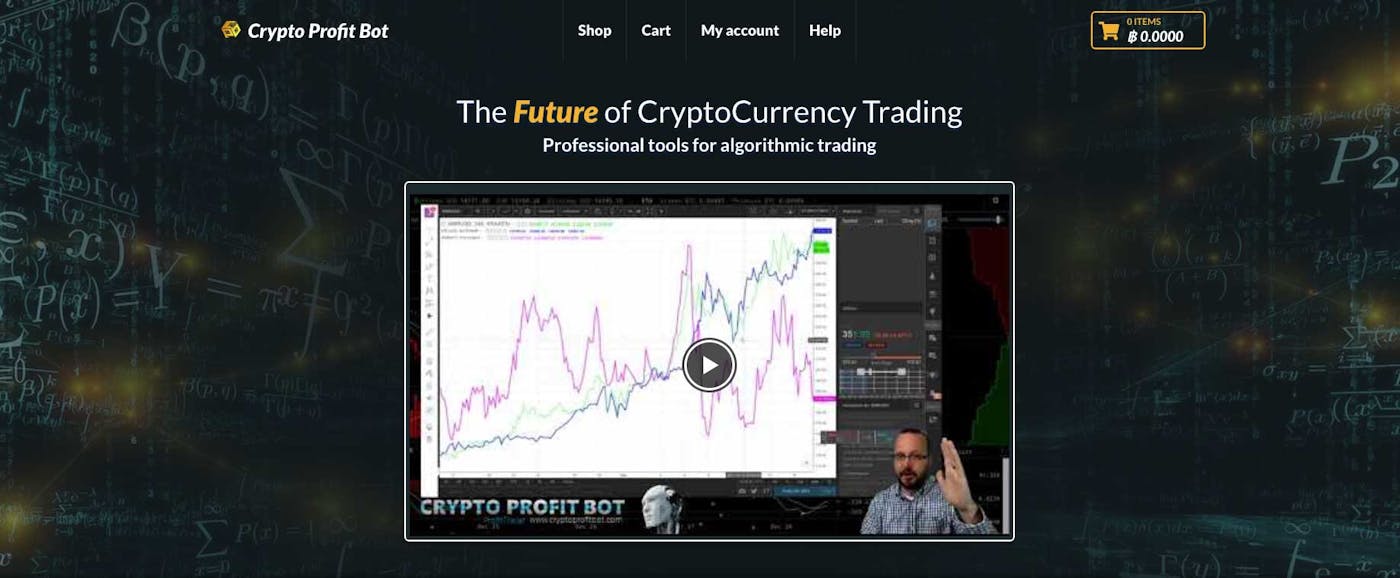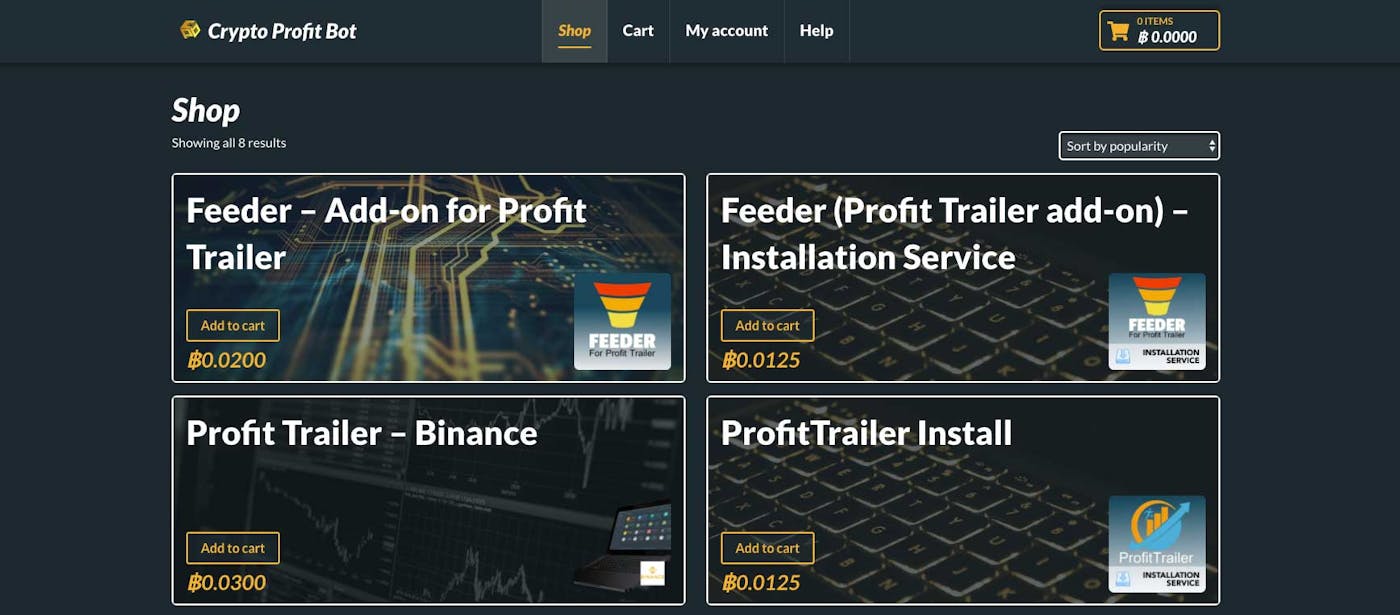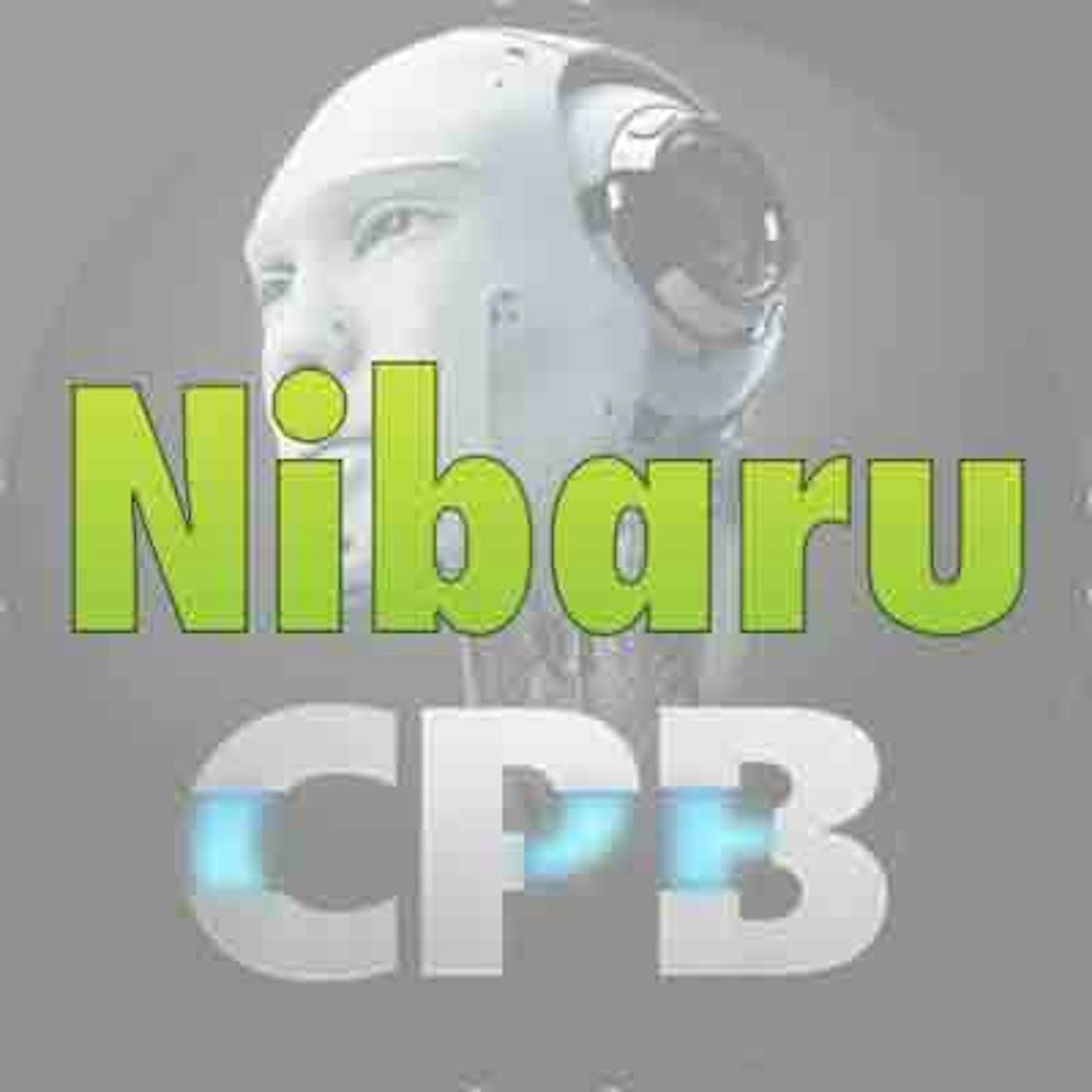Moving Quickly into the Crypto Market and Seeing Explosive
Growth
 Channing
Thanks for doing a joint interview! Mind sharing your backgrounds and what you do at CryptoProfitBot?
Channing
Thanks for doing a joint interview! Mind sharing your backgrounds and what you do at CryptoProfitBot?
I'm the oldest of our crew. I've been coding since I was in grade school and have been through too many startups to count, some of them my own. Most have failed but a few exited, and with one of mine I actually got some money from the exit. I started to pay serious attention to crypto in late 2016. I'm a language polyglot but mostly stick to Ruby, Swift, Bash, and Javascript in web or mobile contexts. I focus mostly on the tech side.
I'm from a software development background in financial services. I've worked on the kinds of products we're building and selling for cryptocurrencies in real-life algorithmic trading organizations. I've been involved in crypto since early 2013, but I've only really started to see success and a future in it since last year. I'm primarily a Python, Swift, and Kotlin developer. I focus mostly on sales and marketing.
I have an IT background, but more in systems and networking than any type of software development. I've been into crypto since learning of Bitcoin in 2010, but really only got into altcoins and trading in 2014. I focus mostly on finance, markets, and support.
Together, we're expanding CryptoProfitBot.com, a sales platform for crypto trading bots, tools, and services. We're a reseller for a trading bot called ProfitTrailer, which is essentially an algorithmic trading bot that works on the biggest cryptocurrency exchanges. In addition, we are the official outlet for a product called Feeder.
Feeder is a market analysis add-on tool which modifies your trading strategies based on the current market trends. It's a complex tool and there are a lot of settings to configure, but at its heart the product enables your bot to adjust buying and selling strategies dynamically every few minutes as the market changes. It helps you make some really good profits when the market is good, and protects you from getting into losing trades when the market is not so good.
Since launch we've done over $1.5m in sales and are on target for $450k for the month of March. Everything we sell right now is priced and paid in Bitcoin, so when or if we convert to USD/CAD (referred to in crypto as "flat currencies"), the fluctuation in price affects our bottom line in dollars.

 Channing
What motivated you to get started with CryptoProfitBot?
Channing
What motivated you to get started with CryptoProfitBot?
Personally, I hated my job. I fell in love with crypto and blockchain technology and began looking for opportunities where I could develop a product. We all met due to our involvement in various crypto communities, and have been trading with one bot or another over the years. We watched as those communities grew too large to be sustainable, saw bad actors scam those with less knowledge, and noticed that some bot developers just didn't seem to know how to make software. I have released many mobile and web production apps, and some of these other bot developers just had no clue how to bring new features to market or how to deal with bugs. Seeing all this, I was chomping at the bit, looking for any way to have a full time job in this space.
The idea for CryptoProfitBot.com came once we got involved in the Feeder project. The generation of bots that existed at the time lived solely on the client side, and were just too simple. In order to get the best performance from them, you needed to take the pulse of the market and adjust your bot strategy.
We began working closely with someone who was looking into this specific problem, and helped usher in the solution — Feeder. We built our expertise by being in the space and actively using the software, helping with development ideas, and beta testing so that we could hit the ground running as knowledgeable users. By doing this, we quickly positioned ourselves to become the sales and support hub once the product emerged, which the developer was happy to let us do. Bringing us on took pressure away from the development team and allowed them to focus on making a better product.
There are so many other products that we can build or sell on CryptoProfitBot.com (there are one or two that are still in the running), but we focused on what seemed like fastest way to build the capital we needed to make our next move. In our eyes, the crypto space is full of opportunity, and it's all very young and evolving. We all had and still have other jobs, but the dream is to create avenues to be able to make a living off of an emerging and exciting field of finance and crypto.
In terms of product validation, it's easy to validate ideas when you're heavily involved in communities. We had a large network of users already dialed in to the space, so we were able to ask questions and spark discussion, take notes, and keep iterating until Feeder was a product that truly met the needs of people wanting to mitigate their trading risk. I was and am still working full time as well, so for me this has been an intense labor of making sure I am 100% focused and able to separate my time out to be effective in both roles.
 Channing
What went into building the initial product?
Channing
What went into building the initial product?
It was totally ad-hoc. We went with Wordpress and WooCommerce because I didn't have to code anything. There was no way I could have built an e-commerce site in Rails or Phoenix in the same timeframe. Once we got that set up we had to figure out the best way to accept Bitcoin. I had previously used a payment processor named GoUrl. They were free to setup but took a cut of every transaction, which we didn't want to do this time around. So, we found a plugin named CryptoWoo that doesn't take any fees, you just pay their yearly subscription fee (around $40). Once we got the go ahead from Feeder's author to start sales, it took us probably 10 hours spread across three or four days to get everything in place. This was a week or two before Christmas in 2017.
When we first talked to someone about a sale, we just wanted somewhere to send them where they could make the purchase and have the payment eventually make its way into our Bitcoin wallet. That was it. We did no custom coding of any kind — the plugins took care of all of the scopes and features. We used sites like Pixabay or Pexels for free images and just threw everything up with a theme we already owned. We funded it all ourselves and paid only for things we really needed. I put it all on a $10/month Vultr virtual private cloud, and we didn't worry about content delivery networks or caching or anything else. Letsencrypt got us sorted on our SSL requirements.
As mentioned, we all had day jobs. I knew I was going to leave mine at the end of the year, so for me it was real. Because we all have families, too, everything was done in early mornings, late nights, and even during work lunch breaks, bathroom breaks, and commute time — literally every free second we had. We knew we had to just keep plugging away, talking to people, looking for sales and anything else we could grab onto. The crypto community is a pretty amazing place because it's all about money to begin with, so people are open to trying all kinds of products and tools. You don't really have to sell anything; if there's a novel approach or a cool thing to try, people just jump in.

 Channing
How have you attracted users and grown CryptoProfitBot?
Channing
How have you attracted users and grown CryptoProfitBot?
Crypto is a heavily personal space, so much so that you have drama between YouTubers, and users follow and listen to their favorites and buy on their advice. I started reaching out to some big players on YouTube and asking them to review the product and see what they thought. Those reviews were massively successful and brought an immediate spike of users to the site, all of them paying customers.
In order to meet the challenge of sustaining growth, we'll need to diversify these YouTube affiliates, as well as find new and interesting people who know what they are talking about when it comes to trading, and see the value in our products. We're also currently hiring for a top marketer who can help expand the reach of our message. We'd like to move beyond the cloistered crypto community and into the minds and hearts of everyday citizens who want a piece of the crypto pie, but don't know where to start.
Launch was forced upon us because the developer of the Feeder product dropped the final version with licensing on Christmas day!
I'd like to think that Feeder was so strong that it sold itself. However, it's a bit of a complicated product, all told. Without strong affiliates and YouTube videos demonstrating how it works, it wouldn't have happened. This wasn't dumb luck — we had foreseen this, and built it into our strategy, positioning ourselves to take advantage of what was already happening. But In all honesty, it was a lot of "right place, right time".
As far as the efforts it took, you have to understand that nothing about this space or community is traditional. This is a growing community of people who are not merely involved in Bitcoin or the myriad of available altcoins, but are trading all of them, and are doing so with a specific breed of automated trading software. I am willing to bet that the majority of users made a lot of gains throughout the boom of 2017, and think nothing of investing in advanced tools to make the whole job easier. We didn't have to send cold emails or slowly build momentum. CryptoProfitBot.com experienced explosive growth because of the right sales affiliates and perfect timing to market.
| Month | Customers |
| Dec '17 | 24 |
| Jan '18 | 3709 |
| Feb '18 | 2656 |
| Mar '18 | 507 |
 Channing
What's your business model, and how have you grown your revenue?
Channing
What's your business model, and how have you grown your revenue?
Currently the only revenue generator is the store, which sells various crypto products and services. However, we feel that initial boom has been enough to provide the buffer needed to bring some new ideas to fruition. Things like platforms for long term (non-algorithmic bot) crypto investing, tax software, more add-ons and improvement for existing trading software, etc.
Early customers were tapped just by opening up the product to existing community members. We used Telegram, a secure messaging service favored by many in the crypto community, to reach out to members that we determined would see program benefits really quickly. For anyone else wanting to jump into this type of thing, I can't overstate how important it is to be part of a community and part of a solution. While it's especially important for this platform, it's the same for anything, really. If you're inventing or selling the next great bathroom washcloth, there's a community out there of house cleaners that you would want to connect with in order to understand their needs, identify their problems, and be a part of helping them make their lives better and easier.
As far as revenue growing and falling — whew! That's a doozy. Just like the crypto markets, we are also susceptible to major swings in sales due to market sentiment and trending products. The key is to be able to stay competitive, which is easier said than done considering how quickly the landscape changes. All of this has been a learning experience in adaptability.
Because of the nature of the space, our revenue numbers fluctuate considerably week to week. It's a turbulent sea of explosive growth, sometimes followed by stomach-lurching declines. It's not for the faint of heart. Nothing worth doing is easy, though!
Margins are extremely high as the overhead is minimal.
| Month | Revenue |
| Dec '17 | 10000 |
| Jan '18 | 1000000 |
| Feb '18 | 560000 |
| Mar '18 | 127000 |
Note: data for March only accounts for the first week of the month.
 Channing
What are your goals for the future?
Channing
What are your goals for the future?
The future as I see it is diversification of our product offerings. We won't be relying just on the sale of individual products; there are a number of subscription services we'll be launching as well as possible fund management and other things. We have a list a mile long, and I see a huge strength in the fact that we have three very smart people looking at this space from some interesting angles.
We're basically going to try to choose new a area, launch, scale, and repeat. We expect to keep this in check by letting things fail fast. No drawn out bleeding; if it doesn't get traction with N metrics in eight weeks, shut it down and move on. I've been a part of these types of experiments in a lot of my startup years and I find that this approach works well. To top it off, crypto moves faster than anything else I've been involved with. We joke all the time about it already being a 'crypto year' (about 3 months) since the markets never stop — unlike traditional markets — and your audience truly is global. So speed is everything.
 Channing
What are the biggest challenges you've faced and obstacles you've overcome? If you had to start over, what would you do differently?
Channing
What are the biggest challenges you've faced and obstacles you've overcome? If you had to start over, what would you do differently?
Hah, yah, we had a massive problem at the beginning of February: we got hacked. We were loose with plugins and some script kids got in through an exploit in one them. From there, they were able to create an admin account, log in, and then replace our Bitcoin and Litecoin wallets with their own.
Luckily we caught this quickly and it only played out for about eight hours. But, they ended up making away with around $20k and it cost us another $15k of downtime. We rebuilt our server from a backup, exclude all non-essential plugins, introduced tighter security measures, and relaunched the next day. Again, everything playing out at crypto speed.
One thing that came out of this experience is we knew that we completely trusted each other despite that we're all remote and only met face to face recently. It was a trial by fire and we came out better for it. For about five minutes, I thought it was all over. I kept thinking,"we can't recover from this, we'll be skewered by the community, we're done". But the other guys didn't think like that. They said, "Nope!, we need to take charge of this". So as a team, we stepped up instead of shrinking back. Obviously it would have been nicer not to have lost almost $40k, but it forced us to reckon and treat everything much more seriously — like a real business. Part of this, too, is that we were moving so fast that we didn't cross every T and dot every I and we suffered a little for it.
So, what would we do differently? Probably not much. The obvious is the hacking bit and not being so careless with Wordpress. We probably also would have focused on the automation sooner. Our first big week of orders had us all working about 18+ hours a day, manually getting users their license keys. I automated this later, but I can't stress how important it is to figure out those time killers as soon as possible and automate them.
 Channing
Have you found anything particularly helpful or advantageous?
Channing
Have you found anything particularly helpful or advantageous?
Jason Calacanis has definitely been a big influence on my life. His show is incredible and the guests are always high quality. I often find myself thinking about what kinds of questions he might ask me about my business ideas if I were on his show, and it helps me consider points I hadn't thought of yet.
For me, it has been a combination of a lot of factors. Luck and timing has played a big part, as well as trends. In crypto, we've seen these patterns before and JRod and I talked extensively last summer and fall and shared speculations that the next 6-12 months were gonna explode. We saw it happen already in 2017 and we knew more people would be catching on in 2018. Outside of that, I filled my head with crypto and blockchain related podcasts and books. I had to stay in that mode and try not to divert my focus to anything else. In order to work out ideas I had or things I wanted to try, I switched to waking up at 4am every day so that I could code and ideate for 2-3 hours before my kids woke up. I had a day job as well, so this really helped me to keep making some kind of progress on what I wanted to do.
 Channing
What's your advice for indie hackers who are just starting out?
Channing
What's your advice for indie hackers who are just starting out?
Find good people to work with, people who you trust and who you can see share your passion and understand the vision. My initial thoughts when we first started seeing real traffic was how well we shared the workload, worked the problems together, and just got shit done. Even during the hack we just got on a call, figured out what needed to be done, and then just got on with it. It was during these periods that I knew I'd found a magic team and that we'd work together on lots of other stuff in the future.
My biggest advice: act. Do something. You can overplan and craft until the cows come home and never get one single customer. Find your customers or product you want to build and go to those communities or markets and put something out there. Don't overthink; act, iterate, kill quickly, move on.
Besides that, as a tech guy, stop the stupid debate about the best technology and just get something working where you collect someone's money. It should be a good product, of course, but it's ok to use the fruits of someone else's labor. I mean, we launched on Wordpress, bought plugins, and then tied all the automation in with Ruby and Python scripts across different servers (some hosted, one in my garage). I'm slightly horrified to even admit that. But, the tech is ultimately only important to you — customers do not care one iota — and should be a comfortable and efficient tool to get something done.
For books, I read a lot of self-help, mind, and spirituality books because they keep me anchored in a "can do" mindset. I also read a lot of books about successful people and how they've developed their habits of living, running their businesses, and becoming and staying wealthy. I believe that wealth is a mindset, and money is a side effect of providing value.
My words of advice for someone else that smells opportunity: it's all about analyzing trends and needs. A growing market needs a lot of things. Some really big — like functional decentralized exchanges — and some smaller, such as better trading tools, or cryptoanalysis engines and services. Find the need, build it out, and reach out to existing members in the space.
 Channing
Where can we go to learn more?
Channing
Where can we go to learn more?
- Our site: cryptoprofitbot.com
- Twitter: @cryptoprofitbot
Feel free to ask us anything about crypto, CryptoProfitBot.com, or whatever else you can think of. Thank you!




Prices are low and it is presenting a good opportunity ... are you excited about the situation? how do you exploit the retracement to your advantage?
Hey,
Loved reading your story, really insightful. Thanks for sharing!
I am not sure if you're already working on this but your website could use a design upgrade. Have extensive design experience in the crypto industry. Let me know if you need help sumit.digitaldesign@gmail.com
Heh, we just did an upgrade in late Feb. I will talk to the other guys and see what they think. Thanks.
Wow that was a fantastic read. Congrats to you all as well. It definitely made me send an email to our CTO about security haha.
Thank you! Glad the security reminder went off. 😁
Keep the updates coming. They are appreciated. DM on twitter sent.
Hey Jay,
We do pay attention to the company twitter account and one of us will contact you. :) Thx!
Great reed , you wroth about community's you involve . What are those community's ? Are they FB groups , forums ? Can u share ?
Hey there. Like I mentioned in the post above, we spent most of 2017 in Telegram groups. When we launched Crypto Profit Bot, we decided to use Discord.
I would point anyone to Telegram and tell them to start there. It's like, the defacto chat too for crypto.
Cheers!
Thanks! can you please tell us how to find / join those telegram group ? i never consider it as discussion group
With us, we got into Telegram because the creator of the bot we were using provided contact and support that way. So, you'll probably have to seek out some of these crypto-based products and see if they have Telegram channels.
https://www.ccn.com is a good crypto news site and they have all kinds of info on ICOs and those groups usually exist on Telegram.
That's probable the best way to start I would think.
Your Mrr and customer chat looks exactly like Bitcoin's chart within the past 4 months. Lol.
How does it feel betting your future on a market like Crypto where your service's appeal ebbs and booms with market sentiment alone?
Also, how have you dealt with this emotional rollercoaster of the declining revenue as a result of price falls?
Thirdly, supposing crypto crashes and dies out and never becomes as big as we hoped, what next?
Hehe, yup!
We're totally comfortable with this market (now) because we already went through those high's and low's last year when we were botting.
Last July was a major downer. Check out Ethereum last July ( https://coinmarketcap.com/currencies/ethereum/ ). The whole year it ramped up and then boom, it lost half its value. This was common with mostly all altcoins last year. So, we already went through that whole grieving wtf period then.
We are all long in this and take profit at the right times; usually when the price is trending up. When bitcoin hit $6k in early Feb, we obviously didn't pay ourselves. A few weeks later, it was back in the $11k's and then I got my payday. So, I just watch for the right times to get paid.
There will probably be a big crash at some point, I don't think any of us disagree on this. But, money is a fickle thing. Look at 2008 and all those banks that were in trouble. It's like, you just have to look for the opportunities and hedge your bets. Bitcoin isn't the only cryptocurrency in town. People transact in Dash, Monero, and others (albeit, very low compared to credit cards and fiat), so I view the Dollar as just another tool. We all hold reserves in multiple currencies and the entire world and crypto economy would have to crash to affect us.
If that happened, heh, I don't know what I would do next. Probably try to grow vegetables in the back yard and just survive. :) If just crypto crashed, I would have to hold (hodl), live off our dollar savings and wait for the next wave.
Outside of the monetary aspect of bitcoin/crypto, I'm very bullish on blockchain. I'm a developer and understand how blockchain works (yes, it's not the best data structure around and can be slow, but it solved the Byzantine Generals problem!). In 2016 I was blown away once I figured out how a 'public ledger' could be applied to pretty much any industry. I've been through a lot of startups and built tons of sites and apps from scratch. So, once you can visualize how to replace this one part with this other part, you can start to see how things will change.
Right now I see the whole software/tech world as inverted. They are the gatekeepers to identity and alls kinds of data about you. As we've seen, this is sold off and stolen and you have no control or rights in regards to that; even with all the laws now, it doesn't matter much.
PKI and distributed blockchain related technologies have the potential to turn all this on its head and put you in control of your data. This is what I'm really excited about and completely bullish on. I left my job at a Google backed company last year because no one cared about any of this. None of the developers did, none of the higher ups - they were all still stuck in the 2000's mindset of centralized services.
The way I look at it is, this is the next big thing; big as in internet big. We'll see ups and downs and in 10 to 20 years, this tech will transform the way we build and use software. So, am I worried? Nope, not one bit. I'm ecstatic. And scrambling to jump in, like, yesterday. :)
Cool. Personally, I asked you that question because I had asked myself the same thing as I am building something in this space too. Your answer provided a fresh perspective to look at things and I am grateful u took the time.
My service is mycryptowiki.com and I am looking for sponsors. It's less than a month old but it's pushing 10k uniques /Mth as at now. Let me know if you did like to be a sponsor at little cost. Win/Win for us.
Let’s talk. 🙂
Cool. Seems like IH doesn't have a Pm structure yet. Kindly reach me at hienyimba@gmail. com
Thanks for sharing this story! The part about how you dealt with the hack so quickly was impressive- can't imagine how stressful that must've been.
I'm working on a daily automated email service analyzing crypto markets (https://coinrecap.io). We're seeing awesome open rates and engagements with our subscribers, whom we got mostly through some posts on Reddit, but we are struggling to find scaleable channels for marketing. Do you have any suggestions? Have you tried any paid acquisition channels, for example, and how did those work out?
Also- it sounds like direct outreach to prominent community members was a big part of your strategy. Was that just cold emailing folks? Any strategies for having success in with that? Thanks again for sharing your story!
Yah, like I said, I was probably the most negative about the hack. I've been in tech a long time and data breaches are common and the blowback can be huge (hello facebook.....). But, luckily, no data was stolen, just diverting of our wallets. Once we had confirmed that, while it sucked, it felt much better. If the data would have been stolen, then I don't know if I could have kept going on..
We have contemplated ppc (pay per click) ala Google & Bing, but honestly, there's no real need for it right now. We still get lots of referrals through our youtube partners, which is all free. We do know that a lot (most?) of the bots we know of do some form of ppc - just search google or bing for 'crypto trading bot'. We are just trying to keep margins as low as possible, but in the future, we haven't ruled that traffic source out.
For community we all started on Telegram. Crypto Profit Bot's community resides on a Discord server. Between these two platforms, there are a lot of crypto related groups. Most of all the ICO teams run on Telegram and if you want more than one channel of communication, then you run on Discord.
The easiest would be to start on Telegram and find channels that would fit with your service (I signed up btw). Then, you just have to figure out the approach you take when trying to reach out to people. Most channels don't like 'spammers', so you have to figure out what strategy works for you. We've had to deal with this exact scenario and what worked for us was to use the products in the channel and then give feedback, discuss, and then ask people's opinion on our product/service.
This can take a while, but it can be worth it if you can get the right people saying good things about your service. Good luck!
Awesome, thanks for your reply. This is super helpful. Would love any feedback you have on the daily newsletter. Continued success with Crypto Profit Bot!
Thanks!
This comment was deleted 5 years ago